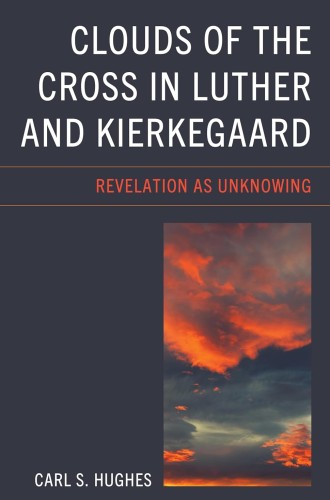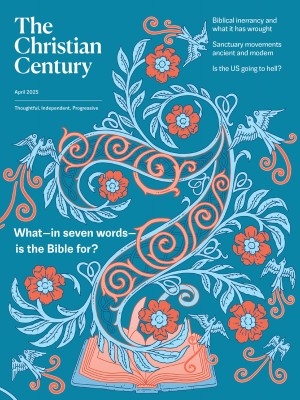A matter of love, not certainty
In Carl Hughes’s hands, Kierkegaard helps to distinguish Luther’s desire for certainty from his appreciation for mystery.

Clouds of the Cross in Luther and Kierkegaard
Revelation as Unknowing
My religious imagination, like that of many Americans, was shaped by Protestant Christianity. I was taught that 16th-century theology, by returning to biblical truth, corrected errors that arose during the dark Middle Ages. The community that raised me identified directly with the first-century church, and it was sure that it knew divine truth while others definitely did not.
In recent years, this theological tradition has come into conflict with democratic pluralism. Evangelical Protestantism is an explicit force in electoral politics, and it implicitly influences the American moral imagination. Despite deep disagreements, other groups have adopted evangelical patterns of thought—whether they are Catholic, atheist, or otherwise. The difficulty is that when some citizens are certain that they know God’s will, they may be tempted to rule in God’s name.
Read our latest issue or browse back issues.
Carl Hughes, who teaches at Texas Lutheran University, addresses the theological roots of this crisis in Clouds of the Cross in Luther and Kierkegaard. Hughes acknowledges the Protestant tendency to treat Christianity as a source of authoritative knowledge, and he shows that there is another side to this tradition that runs just as deep. By retrieving Lutheran theology with exceptional care, Hughes suggests that Christian faith is a matter not of certainty but of love.
Hughes grounds his argument in the works of Martin Luther and Søren Kierkegaard—a hero of the Reformation and Luther’s modern successor. As Hughes explains, Luther sometimes suggests that faith is a form of certainty, but he also describes revelation as an experience of paradox that undoes every claim to grasp the Divine. Rather than imposing perfect coherence on Luther’s work, Hughes writes that “a more faithful reading of him would appreciate how he bore witness to Christ amid the chaos of his life . . . and then ponder how we might do the same in the chaos of our own.”
After tracing this tension in Luther’s thought (while taking it on its own terms), Hughes turns to Kierkegaard. Although Kierkegaard is usually read as a philosopher with a skeptical streak, Hughes shows that he is a deeply theological thinker. By reading Kierkegaard as a Lutheran thinker, Hughes also brings out what we might call the Kierkegaardian side of Luther’s work. In Hughes’s hands, Kierkegaard helps to distinguish Luther’s desire for certainty from his appreciation for mystery.
Although Kierkegaard was a critic of his own Danish Lutheran contemporaries, Hughes argues that he was motivated by fidelity to Luther’s vision. Despite their distance, both thinkers place the person of Jesus Christ at the heart of revelation, and they both understand faith as a lived practice rather than an intellectual affirmation. According to Hughes, Kierkegaard brings to light the best side of the Lutheran tradition—not because Kierkegaard is modern but because he is surprisingly close to ancient traditions.
The book’s most innovative claim is that Luther and Kierkegaard inherited the negative theology of their medieval predecessors. Although Luther explicitly rejected this tradition, Hughes carefully shows that the reformer nevertheless adopted imagery and ideas from the mystical theologian Dionysius the Areopagite. Like Dionysius, Luther and Kierkegaard place love at the center of their work—a love that relinquishes abstract knowledge through contemplation of Jesus Christ. Hughes explains: “These negations shift the mode of relationship to God from detached thought to relational existence.” By underlining the limits of reason, this form of theology focuses on faith as it is lived in the world.
By foregrounding darkness and unknowing, Hughes develops a hopeful vision of Lutheran theology. As he observes, debates over sexuality, gender, and race can’t be settled definitively by appeals to the Bible. Facing this ambiguity involves a measure of risk, but that does not mean Christians are reduced to bare silence. Instead, following the genres established in scripture, Hughes presents Christian thought as a practice of poetry and narrative. He writes, “It is a matter of living in relationship to what defies our understanding and allowing ourselves to be changed by it in ways we cannot fully foresee.” This is a profoundly biblical theology, one that takes faith as a force for transformation rather than a source of information.
Clouds of the Cross is grounded in meticulous scholarship, but it is squarely focused on contemporary questions. As Hughes puts it, “to read Luther and Kierkegaard as they themselves want to be read . . . is to read them as living voices bearing Christ to our world in constantly evolving ways.” Because Hughes writes in a generous and accessible style, this book will benefit anyone seeking a theology that is faithful without falling into false certainty.
Although Hughes does not focus on contemporary politics, I think he offers an important contribution to debates over religion and public life. His retrieval of Lutheran traditions offers a compelling rebuttal to those who identify God’s will with their own understanding. By reclaiming Protestant theology from its loudest defenders, he suggests that the fractures that shape American politics are not inevitable. Where some use Christian thought as a weapon against other groups, Hughes shows that it can enrich the work of racial and economic justice.
Protestants often pretend as if nothing happened between the death of Paul and the Reformation that Luther set in motion. However, as Hughes reminds us, this tradition was shaped by what went before, and it has evolved into diverse forms in different times and places. By bringing the past into view, Hughes’s thoughtful book opens future possibilities for a tradition that still carries considerable power.






